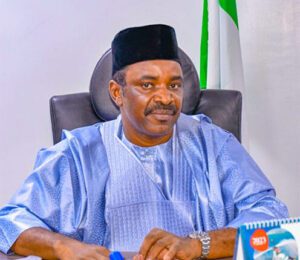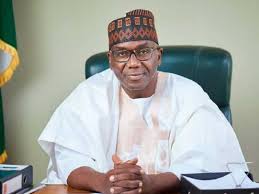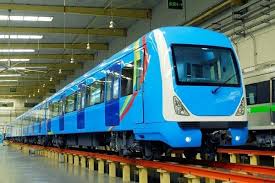Transport Review 2021: Maritime sector performs below expectation, as Rail infrastructure experiences massive growth
The year 2021 was a mixed year for stakeholders in the Maritime industry and Rail sector, as the Maritime sector didn’t meet up with expectations in terms of security, cargo clearance, gridlock among others despite huge investment by federal government, why the rail sector florish interm of new development in the country. SEUN IBIYEMI takes a look at major events that shape both sector in 2021.
Like every other year, lack of enforcement of maritime related policies posed a huge setback for the nation’s maritime sector, in addition to myriads of other factors ranging from poor seaport access roads, lack of holding bays and quay, inadequate truck parks, and ineffective traffic management around the ports, especially within the country’s two busiest ports in Lagos.
For instance, stakeholders expected the port to be fully automated, the deployment of deep blue project expected to put an end to maritime crimes and piracy in the nation’s coastal water and Gulf of Guinea (GoG), among others.
But, while the electronic call-up system solved the crisis of the traffic gridlock on the port access road, other things, such as container deposit, shipping surcharge, Lagos -Onitsha barging initiative of the National Inland Waterways Authority (NIWA), among others, are still begging for closer attention.
MARITIME SECURITY (DEPLOYMENT OF DEEP BLUE PROJECT)
Federal Government in June of 2021 launched its maritime security assets under the Integrated National Security and Waterways Protection Infrastructure, also known as the Deep Blue Project.
The Project, which was initiated by the Federal Ministry of Transportation and Federal Ministry of Defence, is being implemented by the Nigerian Maritime Administration and Safety Agency (NIMASA).
The main objective of the Deep Blue Project is to secure Nigerian waters up to the Gulf of Guinea (GoG). The Project has three categories of platforms to tackle maritime security on land, sea, and air.
The land assets include the Command, Control, Communication, Computer, and Intelligence Centre (C4i) for intelligence gathering and data collection; 16 armoured vehicles for coastal patrol; and 600 specially trained troops for interdiction, known as Maritime Security Unit.
The sea assets include two Special Mission Vessels and 17 Fast Interceptor Boats. The air assets comprise two Special Mission Aircraft for surveillance of the country’s Exclusive Economic Zone (EEZ); three Special Mission Helicopters for search and rescue operations; and four Unmanned Aerial Vehicles.
The Deep Blue Project is the first integrated maritime security strategy in West and Central Africa with the aim of tackling the cases of piracy, sea robbery, and other crimes at sea.
With the official launch of the Deep Blue project in June (though it had been operational since February 2021), the International Maritime Bureau (IMB) in October said incidents of piracy in the first nine months of 2021 in the GoG are the lowest reported in 17 years.
The latest report from the IMB showed that the Gulf of Guinea region recorded 28 incidents of piracy and armed robbery in the first nine months of 2021, compared to 46 at the same period in 2020.
The report noted that: “Nigeria reported only four, compared to 17 in 2020 and 41 in 2018. Crew kidnappings in the region dropped with a single crew member kidnapped in quarter three of 2021, compared to 31 in five separate incidents during the same quarter in the preceding year.”
PORT AUTOMATION and CONGESTION
Despite the federal government’s assurance that all Nigerian seaports will be fully automated before the end of second quarter 2021, the ports still operate manually thereby breeding corruption and inefficiency.
The erstwhile executive secretary, Nigerian Shippers’ Council (NSC), Barr. Hassan Bello expressed the council’s intent to achieve 90 per cent automation across all aspects of port operations before the end of the second quarter of 2021.
Bello, who expressed optimism that activities of shipping lines and terminals will attain a minimum of 90 per cent automation by June 2021, added that, digitalisation would help curb delays, boost efficiency and reduce revenue leakages in the port system.
He, however, noted that absence of scanners and consequent 100 per cent physical examination of cargoes could mar the realisation of the port automation goal but expressed delight at the electronic truck call-up system introduced by Nigerian Ports Authority (NPA).
Bello said “Nigeria ports should be the hub in the West and Central Africa region. However, we can’t achieve this without ports that are fully automated and operate 24 hours daily. Most ports across the world are digitalised. Human contact is dangerous; it brings delays and extortion.
“Also, congestion at the nation’s busiest seaports, Apapa and Tin-Can Island due to overtime cargoes which were abandoned by importers, is a major challenge in 2021.These cargoes have affected efficiency of the seaports and has made it operate below capacity.”
Port congestion in addition to the operational equipment deficiencies, archaic clearing processes and huge turn around time of cargoes have further worsened the efficiency of the Apapa and Tin-Can Island Ports.
It was gathered that the volume of abandoned and overtime cargoes at the seaport is now over 6000 containers and is still increasing. The abandoned shipments also includes over 1,800 vehicles.
According to the managing director, Nigerian Ports Authority (NPA), Bello-Koko, the situation is undermining the efficiency of the ports system as the problem which hitherto was limited to Lagos ports is now spreading to other ports in other parts of the country.
The NPA boss also disclosed that there are abandoned containers that have been in the ports for more than 20 years, adding that, the continued stay of the problem cargoes is now a major contributing factor to the current congestion being experienced at the ports across the country adding that the Ikorodu Lighter Terminal (ILT) where these categories of cargoes are taken is also filled up.
He further disclosed that the NPA has written to the Comptroller-General of the Nigeria Customs Service, NCS, appealing that they speed up the process of auctioning these containers.
Rail
2021 began on a high for the nation’s rail sector with the introduction of e-ticketing for train services on the Abuja-Kaduna route by the Nigerian Railway Corporation (NRC) in January. According to the Managing Director of the NRC, Fidet Okhiria, the essence of e-ticketing is to enable people to access tickets easily, especially during the period of social distancing due to the COVID-19 pandemic. Okhiria added that the e-ticketing would also ensure that the database of all passengers boarding the train was captured in case of emergencies and for other purposes.
This initiative was also followed by the commencement of full passenger train services on the Lagos-Ibadan standard gauge rail in June of 2021 when President Mohammadu Buhari flagged off the service in Lagos. The commencement of the Lagos-Ibadan train services, alongside the Abuja-Kaduna and Warri-Itakpe train services which had earlier begun in 2020, revolutionized train services in Nigeria. The Lagos-Ibadan rail services commencement completed the trio of provision of modern train services to Nigerians as earlier promised by the Federal Government.
However, a bomb blast on one of the rail tracks of the Abuja-Kaduna train services in October almost changed the way passengers view the train services as an alternative to road transport that had now become prone to bandits attacks and abductions.
Despite this ups and downs, stakeholders in the sector has said that maritime sector didn’t meet up with expectations.
In a chat with Nigerian NewsDirect, Project Coordinator of the Agge Deep Sea Port and a former Director of Operations at the Nigerian Maritime Administration and Safety Agency (NIMASA), Captain Warredi Enisuoh, speaks on challenges battling the Maritime sector.
Maritime Security
He said “one thing I expect would happen in the 2021 is that the piracy figure we’ll be down, it’s not because of the Deep Blue, but is the actions that have been taken by the community leaders in the Delta, I’m not going to go into that.
Especially Delta State, there is a mapped out plan that nobody should use it water for kidnapping, that is why the level of piracy is down.”
Port Automation
He said, “Port automation would have been the best way to go, but to automate the port to go on full automation, you can’t do full automation, within even the next three years, in our climate, because for you to get a port to be fully automated, you have to do yard automation, you have to do terminal automation, and three, you have to do hinterland automation.
“All these three would have to be done before a port can be said to be fully automated. So to be able to assist, that means you must clear the roads, there are no trucks near your port, every container that comes out, is on the move, every container that goes in is also on the move.
“Then you must have technical systems that are going to literally take out the human element, which at the moment is enriched mean a lot of people and those people that the human element is enriching. How are they going to allow you to make difference?”
NPA Electronic Call-up system
He said “Well, the Nigerian Ports Authority and indeed the federal government has done a good thing. No doubt this is a laudable thing to do, I believe also they’ve tried it
“But my recommendation is that instead of allowing, such a good thing to go down, they should sit around the table and see how they can convince the reasons why the thing didn’t work.
“It is just for them to go back to the drawing board and see was it because the ports was not automated, maybe I don’t know, then bring up the plan on how you’re going to automate the port.
“Even if it’s a five year plan, it doesn’t matter, but at least put it in such a way that it will be followed judiciously. So at some generation or at some point within a particular planned period, you know, you’ll be able to achieve in one way or the other.”
Accessing the year 2021, he said “the Maritime sector is still way below its full potential in terms of Nigeria, because you could put in so much money into something.
“But there are certain mechanisms that are supposed to be in place before you throw in money, or else it will be as if you didn’t even spend money.
“Because those things that are supposed to be in place would map out the way you’re going to use your resources. Or else you be using your resources to find challenges that will not yield results.
“So if you plan very well and say, okay, look, take one bit at a time, the way to automate maybe the terminal. Next, we’re going automate the yard. Next, we’re going automate the hinterland, you know, just in phases.
“let me be honest with you, maybe when you look at it, it may even be better for you to completely plan a new port, and fully automate the port, and then use the lessons learned to develop the old ones. That may sometimes do what you have to do. Yeah, it may be expensive, but on the long run, it will be cheaper.”




